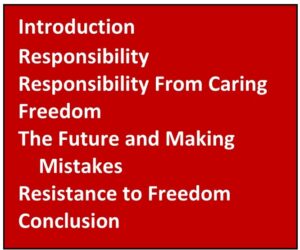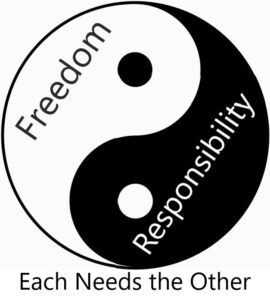Responsibility, Caring, and Freedom
INTRODUCTION
In the past four Letters we have been exploring responsibility and false responsibility. In this Letter we explore responsibility, caring, and freedom. Freedom is a very complex topic. We offer some fundamental ideas about freedom and show how responsibility and freedom are connected. In discussing how responsibility and freedom are connected, we again show how crucial taking responsibility is for creating a good life.
Part of being responsible is seeing the consequences of our behavior, how are behavior impacts others. Here is a covid-19 lesson: my behavior impacts others. Transmission of the virus could continue until we learn this lesson.
RESPONSIBILITY
Responsibility is being held accountable for our behavior either by other people or more importantly by ourselves. To be accountable and responsible we need to accept ownership, to acknowledge that something we did belongs to us. Responsibility and ownership are inseparable. The opposite is denial, denial of ownership and denial of responsibility.
In our discussions about responsibility we have focused on behavior, taking responsibility for our behavior. But before we act (our behavior) we think and feel. These combine into the impulses which drive our behavior. We can own and take responsibility for our thinking and feeling. This is truly empowering as we begin to deal with the thoughts and feelings that determine how we live our life.
Point Of Empowerment: Owning, (taking responsibility for) our thinking and feeling is the start to creating the life we want.
RESPONSIBILITY FROM CARING
The kind of responsibility we have been discussing comes predominantly from the conscience. A healthy conscience shows us right from wrong and urges us to move in the right direction. (A healthy conscience does not make demands accompanied by the threat of punishment. A punishment that always includes guilt and sometimes shame.)
There is a type of responsibility that comes from caring. “Because I care about you I will be aware of the impact my behavior has on you. I will take responsibility for my behavior.” This is a much “softer” kind of responsibility than the responsibility that flows from conscience. It makes life richer and more fulfilling.
Point Of Empowerment: “Because I care about others I look at the impact of my behavior and hold myself responsible. Beyond what my conscience tells me, I do this out of caring and love. I repeat beneficial behavior and change destructive/hurtful behavior.”
Point Of Empowerment: Taking responsibility is a loving act.
Practice: Express your love by taking responsibility.
FREEDOM
Point Of Empowerment: Freedom feels good. We love feeling free. We say with great enjoyment, “I feel free.”
Freedom is having a choice, actually it’s having the opportunity to make a choice. We may have a choice but cannot take advantage of the opportunity to choose. “I have a choice between hamburger and chicken but I am too sick to eat anything so even though I have the choice I can’t take advantage of the opportunity to choose.” “I want to buy a car, there are many to choose from, and I want to choose one. However, I can’t exercise my freedom of choice because of paralyzing indecision.”
We can see that there are degrees of freedom, how much freedom a person has. This can be clearly seen when we compare the amount of freedom that exists in various countries. In the United States a person is free to live wherever (s)he wants and free to leave the country. In another country a person is not free to live wherever (s)he wants and not free to leave the country.
As human beings we have the ability to recognize and evaluate alternatives and to choose one of them. In order to make a choice we use this ability. To use this ability effectively we have to own it by recognizing that it belongs to us. Remember, the act of recognizing and taking ownership is the act of taking responsibility. If we are not taking responsibility for our ability to choose we cannot consciously make the most of our freedom by choosing from all possibilities.
Point Of Empowerment: When we own and use our ability to choose we exercise our freedom.
If we are to use our freedom we need to be able to recognize that we have a choice. In truth, we always have a choice though we may not like the choices that are presented to us. We choose, we use our freedom, with varying degrees of awareness from automatic choice to conscious choice after intense deliberation. When we make a choice with awareness that we are choosing, we can use our freedom to precisely create the future we want. “I choose to go to the movies,” creates a future with the movies in it.
THE FUTURE AND MAKING MISTAKES
As we use our freedom we are looking toward the future and expecting that that future will become our present. How we relate to our future is so very important. Is our relationship with our future filled with fear? If we feel fear about our future we will look away and not see our opportunities for choice. We need:
- Optimism about the future.
- The courage to face the uncertainty of the future.
- The self-confidence that we can cope with what the future will bring us and that we will make choices that are good for us. Self-confidence helps us relax into our future.
- A belief and hope that our future can be better than our past and our present. The hope that our future can be better grows from our willingness to be responsible. If we know that we avoid responsibility we will feel discouraged about our future. This knowing may be unconscious.
- To feel good about our future we need to accept that it is ok to make mistakes, that we can make a wrong choice, a choice that causes pain. Otherwise as we face the future we become anxious, anxious that we will make a mistake and beat ourselves up for it. If we hold perfectionistic standards for ourself we will not accept that we make mistakes. Our harsh conscience will punish us. In contrast, everyone has heard, “Learn from your mistakes.” Mistakes are inevitable and of value if we learn from them.
RESISTANCE TO FREEDOM
Many people experience freedom as a burden, experiencing feelings ranging from discomfort to intense fear. A major aspect of freedom is uncertainty about the future. This uncertainty can cause anxiety. “Will my choices get me what I want? Since the outcome of my actions is uncertain, I feel anxious.” Other feelings can be triggered by freedom such as inadequacy, pessimism, confusion, lack of deserving, low self-worth, low self-esteem, and depression. Since these feelings are painful we avoid choice, the future, and freedom to avoid experiencing these feelings. We think that it is better not to look toward the future but to go on autopilot, live without awareness. We don’t create hope or expectations for something better in our future. With this approach we are fooling ourselves because we automatically have desires for what we want in life and automatically generate expectations that our desires will be fulfilled.
Using our freedom brings change. We fear and resist change and therefore resist freedom. We reject and don’t use our freedom. To be free we must be ok with change. We can be ok with change if we understand that we can create the change we want by using choice and freedom.
Extreme resistance to freedom is seen in people who hold extreme beliefs. They very often belong to a group or community where there are strict rules, procedures, and rituals to be followed. Individual freedom is not allowed. They have given up their freedom to have a life without choice and therefore a life without uncertainty. The future is scripted. This provides a sense of safety and security. This safety and security is an illusion because the future of human beings contains some uncertainty that cannot be eliminated. The uncertainty can be denied and ignored but not eliminated. In addition, it is not possible to be alive and not have a future. The future cannot be eliminated.
In countries where freedom is not allowed some people are happy to give up their freedom in exchange for security but it is security that excludes thinking for yourself. When you don’t think for yourself you give up your freedom and allow yourself to be told what to do, how to do it, and when to do it. At the same time there are other people in these countries who desperately long for freedom. Some people are willing to give up their lives in the fight for freedom.
There are and have been countries that force people to act in destructive, sometimes murderous, ways. There is little freedom in these situations. “Do as you are told or be killed,” not much of a choice. Where there is force, where does responsibility lie? These seem to be situations where there is shared responsibility for an individual’s destructive/murderous actions.
Point of Empowerment: Where “do or die” choices present themselves to an individual, there is little freedom and therefore reduced responsibility. There may be reduced responsibility, but a person is still responsible for his/her behavior. Full responsibility requires freedom of choice.
CONCLUSION
We have been exploring responsibility and freedom, both profound aspects of our lives. Our growth comes from using responsibility and freedom, learning from our mistakes, and overcoming our resistances. With responsibility and freedom we use our creativity to create the life we want.
The kind of freedom to create the life we want could be called the freedom to, the freedom to create our future. This kind of freedom can be contrasted with the freedom from, freedom from the unwanted influence of the past or from unwanted compulsions. We will discuss more about the freedom from in our next Letter.
